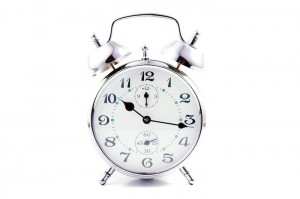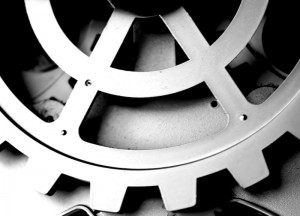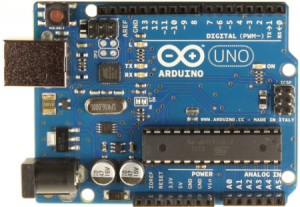Back in 1999 I worked on a project with the US Army that incorporated RFID scanners for logistics tracking. At the time it was an extraordinarily neat concept, using a combination of Oracle, Forms (in Developer/2000) and RFID tags/sensors to track inventory. As items were loaded onto trucks, a barcode scanner (3 of 9, how I love thee, let me count the ways) would feed the record into a database and write it to a gray box called an RFID tag. Once all the inventory was on the truck the tag would be hung on a peg on the trailer wall and the truck would go on its merry (or not so merry depending on the location) way.
At the target warehouse there were UFO shaped objects that acted as RFID sensors. When the truck arrived at the depot, the tag hanging inside the trailer would be read and the expected inventory list loaded into a database. Teams unloaded and scanned each item confirming that all the required inventory made it in time. It was a cool use of sensor technology and a project that greatly piqued my interest in communications enabled ‘things’.
Little did I know that in that same year, a guy named Kevin Ashton used the phrase “Internet of Things”, something he is now semi-famous for. The work I was doing was something of a proto-version of what we now think of as the Internet of Things. Objects with sensors, RFID or other wireless communications, and the Internet as their chatroom.
Now I could write about how the Internet of Things is going to revolutionize business, save the planet, and change medicine as we know it. But today I’m in a selfish and somewhat whimsical mood, so we’ll talk about how it will make my day more awesome.
My ideal day with all the Things
 As morning time rolls around, my bed begins to vibrate slightly. It does this in a way similar to the Jawbone Up, sensing when I am in the lightest stage of sleep and using vibration to gently nudge me out of it before the time I am supposed to wake up. This is a great and gentle way to wake up that I find very refreshing. As the bed wakes me for the morning ritual, it stores information about my sleep and waking patterns to a data store and sends messages that yes, Steve has arrived from the land of slumber.
As morning time rolls around, my bed begins to vibrate slightly. It does this in a way similar to the Jawbone Up, sensing when I am in the lightest stage of sleep and using vibration to gently nudge me out of it before the time I am supposed to wake up. This is a great and gentle way to wake up that I find very refreshing. As the bed wakes me for the morning ritual, it stores information about my sleep and waking patterns to a data store and sends messages that yes, Steve has arrived from the land of slumber.
When my eyes crack open and the bed knows that I am fully awake based on my movements, my shower will turn on and begin heating up. Sensors on the tub floor will keep track of how long it takes for the water to get hot and how long it takes me to actually step into it to ensure proper use of water and gas heating. If there is a time discrepancy, the next morning will be adjusted to maximize resource savings. I step into the shower and notice my bar of soap is nearly out; luckily, the soap tray knew that before I did based on the weight of the bar and has already ordered me a replacement online that will get here tomorrow. As I go on about my shower, sensors pick up the relevant details about my movements, the time I take, and the amount of water consumed for storage and later analysis.
I leave the shower and the coffee maker downstairs starts brewing the morning cup. One I get to the sink and pick up my shaving cream and razor
(call me old fashioned) the hot water comes on so I can lather up. When my hand comes up to my face with the razor, the water shuts off. When I put the razor under the faucet to rinse, the water comes on. Consider my water bill optimized.
The light shuts off as I leave the bathroom and I get dressed. A quiet ‘ding’ chimes, notifying me that I forgot my wallet on the nightstand. Chagrined and duly chastised I make my way downstairs and enjoy the perfectly heated coffee. Based on analysis of my morning schedule over the last few weeks it knows that I won’t shave tomorrow so my schedule will be different. Either way the coffee brews at just the right time, far better than it did during the Switch Age (on/off) or the Chronolithic Era (timers). The outside temperature and estimated high are pushed to my phone as I walk toward the closet so I can pick the best jacket. As my movement patterns around the house indicate that I will be leaving it in about five minutes, my car starts outside so it can be warmed up by the time I get out there.
My car knows I was moving rather sluggishly this morning so it puts on some fast paced epic music to wake me up. A default route to work is ready on the GPS based on my driving habits and traffic patterns. As I’m driving, the gas light on the car blinks on and my GPS adds a waypoint to the nearest gas station on my route so I can tank up. When I arrive and pull up to the pump, the ‘Regular Unleaded’ option is already selected based on my car’s requirements and my previous purchase habits. Since I live in New Jersey someone else will always pump my gas for me, and it stops pumping at the optimal fill point based on my car’s requirements. My GPS recalculates and points me on the best way to continue the drive to the office.
 At work, the elevator is called when I get within twenty feet of it (unless it was already called by another person). Once I get to my floor I make my way to my office and the light automatically flips on to a brightness based on the ambient light in the room. The monitor flips on as well so I can get logged in quickly. The phone rings once but then goes to voicemail because I have a meeting coming up in fifteen minutes and my computer system knows it requires some preparation due to the amount of documentation tagged as relevant to the meeting topic. I’m free to go on about my workday in the usual way while my screensaver and monitor automatically engage when I leave my seat for what it knows to be a longer than average time. Historical analysis and the sluggish way I’m working on the computer lead to a notification that it would be a good time for lunch and a walk. The computer pops up several local places and suggested menu items based on analysis of my preferences, my recent dietary choices, and the weight trend from stepping on the scale this morning.
At work, the elevator is called when I get within twenty feet of it (unless it was already called by another person). Once I get to my floor I make my way to my office and the light automatically flips on to a brightness based on the ambient light in the room. The monitor flips on as well so I can get logged in quickly. The phone rings once but then goes to voicemail because I have a meeting coming up in fifteen minutes and my computer system knows it requires some preparation due to the amount of documentation tagged as relevant to the meeting topic. I’m free to go on about my workday in the usual way while my screensaver and monitor automatically engage when I leave my seat for what it knows to be a longer than average time. Historical analysis and the sluggish way I’m working on the computer lead to a notification that it would be a good time for lunch and a walk. The computer pops up several local places and suggested menu items based on analysis of my preferences, my recent dietary choices, and the weight trend from stepping on the scale this morning.
After a hard day of having Things tell me what to do, it’s time to head home. Before I head out, I open an app on the phone and indicate that I want to bring pizza home for the family for dinner. As I head home geofencing notes when I’m within a 15 minute distance to the pizza place and puts in my carry out order so it will be ready and piping hot as soon as I arrive. Upon picking it up a text will go out to my wife and/or kids that I’m on the way home with pizza so be ready to feast.
Oh no! On the way home my car gets in a wreck (not a typical day for me). Nothing too serious, though the pizza does slide out of the box onto the floor of the car. No, that doesn’t send an alert that I need more pizza, that would be ridiculous. The car however notifies local police and my insurance company that there was a wreck, calculates where I was hit and begins to form assumptions on whose fault it was. All of the data it collects will be helpful should I need to go to court for the wreck. Unfortunately we don’t have medical tricorders yet but if we did they would be scanning me to make sure I am okay and don’t require medical attention. Perhaps a decibel indicator to see how loud I’m screaming? I digress…this is getting a little gruesome.
Thankfully it was only a small fender bender and I can head home (minus pizza). Something brooding and dark by Leonard Cohen plays on the radio since I’m obviously in a bad mood. When I get home, the garage door automatically opens as my car nears it so I can head into the house and finish the rest of my day in peace. Thankfully there are several good shows for me to watch that my TiVo automatically recorded for me based on my analyzed preference and habits.
Will the Internet of Things Really Make It So?
I have no doubt that this is our future. Notice that except for the tricorder, I didn’t name a single thing we can’t already do with current technology. As consumerism, marketing, and convenience shopping grow you will find more an more seemingly innocent objects around the home joining the Internet of Things. The addition of sensors and communications technology to everyday items will absolutely revolutionize the way we go about our day to day lives. Perhaps it will make us inattentive and lazy, unable to think or do for ourselves. And of course there are very real privacy concerns surrounding the huge use of sensors it will bring into every day life. But as with all things, convenience and progress will win out in the end. The Internet of Things is here to stay.
 And it’s not just for big companies either. With tiny computers like the Raspberry Pi available for only $25 or rapid prototyping technology like Arduino anyone can jump in on the action. The interest is obviously there… just check out this Kickstarter for RFDuino, an RF enabled microcontroller for Arduino shrunk down to the size of a fingertip that has smashed through its $5,000 goal and currently sits at ~$300,000. Tech that cheap and that small will allow every electronics hobbyist to create communicating sensor based things on the internet.
And it’s not just for big companies either. With tiny computers like the Raspberry Pi available for only $25 or rapid prototyping technology like Arduino anyone can jump in on the action. The interest is obviously there… just check out this Kickstarter for RFDuino, an RF enabled microcontroller for Arduino shrunk down to the size of a fingertip that has smashed through its $5,000 goal and currently sits at ~$300,000. Tech that cheap and that small will allow every electronics hobbyist to create communicating sensor based things on the internet.
And of course, there is the world of Wearable Computing which is already taking off in a big way. By wearing the sensors everywhere we go, a huge amount of data collection is capable to track and analyze everything we do at every time of the day.
Personally I’m excited about the insight that this kind of technology can bring into our lives. Privacy and the decay of human awareness notwithstanding, it’s an inevitable and exciting way to bring sensors, objects, humans, and big data to a stunning and revolutionizing culmination.


Huh, 1990 I did an inventory tracking project for the military. It seems in base housing, they have to pass an inspection when they move out. So if someone broke an appliance, they’d swap them around before and after inspections, with the broke ones always winding up in vacant houses.
Which brings up the real issue with the internet of things – it has to exist in the world of people. I heard a comedian on the radio ranting about automation in bathrooms. The part about toilets flushing while you are on them just about made me have a car accident. I have a relative who uses Chronolithic technology to implement ancient rules about not working on the Sabbath. A TV show featured a company dedicated to inventing those kinds of products.
Internet of things shouldn’t happen until designers watch Mickey Mouse as the Sorcerer’s Apprentice with their eyes pinned open, like in A Clockwork Orange. Your soap vendor goes out of business, your computer subs a similar product, and you find out you are allergic when your skin starts itching while presenting in front of 500 critical DBA’s…
more articles : http://techonomy.com/2013/05/why-an-internet-of-everything-event-its-the-world-waking-up/